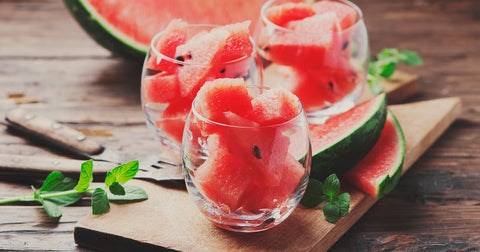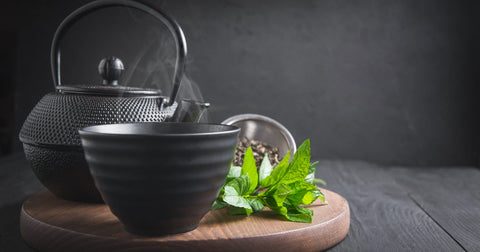Morning sickness, that unwelcome companion during the first trimester of pregnancy, can make even the thought of food unbearable. But nourishing your body and your growing baby is crucial, even when nausea strikes.

If you're a woman navigating the challenges of pregnancy, this article will guide you through eight foods that can help combat nausea and offer insights into managing food intolerances for a smoother pregnancy journey.
Understanding Nausea During Pregnancy
Nausea and vomiting during pregnancy, often referred to as morning sickness, are primarily caused by hormonal fluctuations, particularly the rise in human chorionic gonadotropin (hCG). While often called "morning sickness," these symptoms can occur at any time of day.
Foods to Fight Nausea During Pregnancy: Gentle Nutrition
When nausea strikes, it's essential to choose foods that are easy on your digestive system and less likely to trigger or worsen your symptoms.
1. Ginger:

-
Nature's Remedy: Ginger has long been used to alleviate nausea and vomiting. It's believed to work by calming the stomach and reducing nausea signals in the brain.
-
How to Enjoy: Try ginger tea, ginger ale, candied ginger, or add fresh ginger to your meals.
2. Crackers:
-
Bland and Soothing: Plain crackers, such as saltines or graham crackers, can help absorb excess stomach acid and ease nausea.
-
Keep them Handy: Keep crackers by your bedside to nibble on if you wake up feeling nauseous.
3. Bananas:
-
Potassium Power: Bananas are a good source of potassium, an electrolyte that can help with nausea and vomiting, especially if you've been dehydrated.
-
Easy to Digest: They're also easy on the stomach and provide a gentle energy boost.
4. Lemon:

-
Citrusy Relief: The scent of lemon can help reduce nausea. Try adding a slice of lemon to your water or tea, or simply inhale the aroma of a fresh lemon peel.
5. Cold Foods:
-
Temperature Trick: Cold foods tend to have less of an odor than hot foods, making them less likely to trigger nausea. Try chilled yogurt, fruit salad, or popsicles.
6. Bland Carbohydrates:
-
Easy on the Tummy: Plain rice, toast, or potatoes are bland carbohydrates that are easy to digest and can help settle your stomach.
7. Broth:

- Hydration and Nourishment: Clear broths, like chicken or vegetable broth, provide fluids and electrolytes, which are essential if you've been vomiting.
8. Peppermint:
- Soothing Aroma: Peppermint can help calm the stomach and reduce nausea. Try peppermint tea or aromatherapy with peppermint essential oil.
What to Eat When Nauseous: Additional Tips
-
Eat small, frequent meals: Avoid large meals that can overwhelm your stomach.
-
Stay hydrated: Sip on fluids throughout the day, even if you don't feel thirsty.
-
Avoid trigger foods: Identify and avoid any foods or smells that worsen your nausea.
-
Get enough rest: Fatigue can exacerbate nausea.
Nausea Medicine for Pregnancy: Safe Options
If natural remedies aren't enough, talk to your doctor about safe and effective nausea medications for pregnancy. Some options include:
-
Vitamin B6: This vitamin has been shown to help with nausea and vomiting during pregnancy.
-
Antihistamines: Certain antihistamines, like doxylamine, can also be effective for nausea.
-
Prescription medications: In severe cases, your doctor might prescribe stronger anti-nausea medications.
Food Intolerance and Pregnancy
While morning sickness is a common cause of nausea during pregnancy, food intolerances can also trigger digestive upset. If you suspect a food intolerance is contributing to your symptoms, consider a food sensitivity test kit.

Key Takeaways:
-
Certain foods can help combat nausea during pregnancy, including ginger, crackers, bananas, and lemon.
-
Choose bland, easily digestible foods and stay hydrated.
-
If natural remedies aren't enough, talk to your doctor about safe medication options.
-
Consider a food sensitivity test to identify potential food intolerances that might be contributing to your nausea.
Remember, this article is intended for informational purposes only and should not be considered a substitute for professional medical advice. If you have any concerns about your health or pregnancy, consult a qualified healthcare professional.
Frequently Asked Questions:
1. Is morning sickness only a problem in the morning?
Despite its name, morning sickness can strike at any time of day or night. While some women experience nausea primarily in the morning, others might feel queasy throughout the day or even wake up with nausea at night.
2. What if I can't keep any food down due to nausea?
If your nausea is severe and you're unable to keep food or fluids down, it's crucial to contact your doctor. Severe vomiting can lead to dehydration and electrolyte imbalances, which can be harmful during pregnancy.
3. Can certain smells trigger nausea during pregnancy?
Yes, heightened sensitivity to smells is common during pregnancy. Certain odors, such as strong perfumes, cooking smells, or even the smell of certain foods, can trigger nausea. If you notice specific smells that bother you, try to avoid them.
4. Will my nausea go away after the first trimester?
For many women, morning sickness subsides after the first trimester as hormone levels stabilize. However, some women might experience nausea throughout their pregnancy. If your nausea is severe or persistent, talk to your doctor about management strategies.
5. I'm experiencing digestive issues beyond nausea during pregnancy. Could it be a food intolerance?
Yes, pregnancy hormones can affect your digestive system and make you more sensitive to certain foods. If you experience symptoms like bloating, gas, or changes in bowel habits, consider a food sensitivity test to identify potential triggers and make dietary adjustments to support your gut health during pregnancy.


.png?v=1737390083)
.png?v=1737187409)


